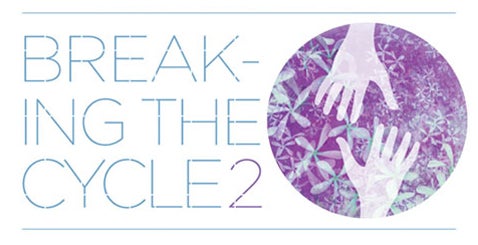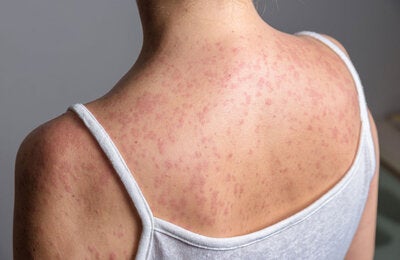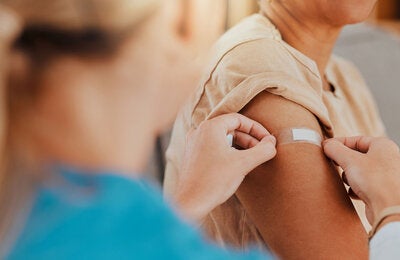

One in three women in the Americas and worldwide will experience physical or sexual violence at the hands of an intimate partner at some point in her life, said participants in a panel discussion held at the Pan American Health Organization/World Health Organization (PAHO.WHO) in observance of the International Day for the Elimination of Violence against Women.
One in three women in the Americas and globally will experience physical or sexual violence at some point in her life
Washington, D.C., 26 November 2013 (PAHO/WHO) —One in three women in the Americas and worldwide will experience physical or sexual violence at the hands of an intimate partner at some point in her life, said participants in a panel discussion titled "Health sector responses to violence against women and girls," held today at the Pan American Health Organization/World Health Organization (PAHO.WHO) in observance of the International Day for the Elimination of Violence against Women. Such violence has long-term consequences for women's mental and physical health as well as for children's health and requires a strong response especially from the health sector, said the panelists.
"Violence against women has such serious consequences for the health of women and children that healthcare institutions have a professional responsibility to ensure that their organizations are prepared to address the implications of violence," said Dr. Jon K. Andrus, PAHO/WHO Deputy Director. "Healthcare providers are uniquely placed to help women who experience violence seek help and receive the care and services they need, including appropriate medical treatment, safety planning in cases of immediate danger, and referral services to broader psychosocial and legal support."
Violence against women and girls is part of a larger series of obstacles that prevent women around the world from contributing fully to their families, communities, and societies, said Catherine Russell, United States Ambassador at Large for Global Women's Issues.
"Every day, there are millions of women whose potentials are stifled by domestic violence, early and forced marriage, misguided norms of honor, traditional harmful practices, and barriers to education, credit, and rights under the law," said Russell. "Yet in recent years, governments and people around the world are beginning to recognize that global stability, peace, and prosperity depend on protecting and advancing the rights of women and girls."
According to a report compiled by WHO, the London School of Hygiene and Tropical Medicine, and the Medical Research Council of South Africa, women exposed to intimate partner violence are twice as likely to experience depression, almost twice as likely to have alcohol use disorders, 16% more likely to have a low birth-weight baby, and 1.5 times more likely to acquire HIV. Moreover, 38% of all murders of women globally are committed by intimate partners.
Alessandra Guedes, PAHO/WHO Advisor on Intra-Family Violence, said healthcare providers are uniquely positioned to screen women for potential victims of violence and to provide first-line support to identified women.
"In this first line of support, providers should be non-judgmental, supporting and validating what the woman is saying and should provide practical care that responds to her concerns but does not intrude," said Guedes. This means, for example, that providers should ask about women's history of violence but should not pressure them to disclose sensitive details or to report their experiences to police. "Providers should also help women access information about existing resources such as legal services and shelters," said Guedes. "And last but not least, they should help ensure the safety of women and their children."
Kiersten Stewart, Director of Public Policy and Advocacy for Futures without Violence, noted that the long-term consequences of violence against women include higher risk of chronic health problems such as asthma, cancer, hypertension, depression, substance abuse, and poor reproductive health outcomes. Violence—or being a witness to violence—also has multi-generational impacts by increasing the likelihood that a child will become a perpetrator of violence as an adult. This points to the need to integrate into health services both screening for potential victims of violence and support interventions for identified victims.
"Women fall through the cracks when we don't ask," said Stewart. "Most women who are assaulted or abused do not go to police. The health sector is the most important for both prevention and treatment of victims."
Derrick Sialondwe, Coordinator of the Child Sexual Abuse Center at Livingstone General Hospital in Zambia, described efforts to call attention to child victims of sexual abuse in his country, to reduce such abuse, and to care for victims. He welcomed new guidelines developed under the U.S. President's Emergency Plan for AIDS Relief (PEPFAR), which include specific guidelines for victims of sexual and physical violence under age 18.
"Most global services are geared to adults and do not meet children's complex needs," said Sialondwe. "It's a different scenario when you are interviewing a child than an adult."
Mary Ellsberg, Director of the Global Women's Institute (GWI) at the George Washington University, noted the need to gather more evidence on the effectiveness of screening and interventions to identify and help women who are victims of violence. She described a recent systematic review of studies in this field carried out by GWI and the World Bank, which found that 14 of 19 interventions in studies that met the review's inclusion criteria has significant positive effects. However, "seventy percent of global evidence about what works and what doesn't work comes from six high-income countries," Ellsberg emphasized. "We are still missing a lot of knowledge about these issues."
Dr. Francisco Becerra, PAHO/WHO Assistant Director, said that PAHO/WHO is working to build the evidence base on violence against women and children, investing in primary prevention, developing strategies to strengthen the health service response, and supporting member states in the development of national plans and policies to address violence against women and children. He called for wide participation in and support for these efforts.
"Collaboration across institutions, countries, and sectors is essential in the effort to address violence against women and to improve the health sector response," said Becerra.
PAHO, founded in 1902, is the oldest international public health organization in the world. It works with its member countries to improve the health and the quality of life of the people of the Americas. It serves as the Regional Office for the Americas of WHO and is part of the Inter-American system.
Links
- PAHO/WHO program on violence against women
- Responding to intimate partner violence and sexual violence against women: WHO clinical and policy guidelines
- WHO report and guidelines
- Complete WHO report
- Link to set of photos from meeting
Media Contacts:
Leticia Linn, linnl@paho.org, Tel. + 202 974 3440, Mobile +1 202 701 4005, Donna Eberwine-Villagran,eberwind@paho.org, Tel. +1 202 974 3122, Mobile +1 202 316 5469, Sebastián Oliel,oliels@paho.org, Phone +1 202 974 3459, Mobile 202 316 5679, Knowledge Management and Communications, PAHO/WHO—www.paho.org



